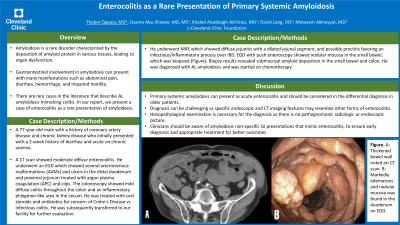Sunday Poster Session
Category: Small Intestine
P1273 - Enterocolitis as a Rare Presentation of Primary Systemic Amyloidosis
Sunday, October 22, 2023
3:30 PM - 7:00 PM PT
Location: Exhibit Hall

- TQ
Thabet Qapaja, MD
Cleveland Clinic
Cleveland, OH
Presenting Author(s)
Thabet Qapaja, MD, Osama Abu-Shawer, MD, MS, Khaled Alsabbagh Alchirazi, MD, David Long, DO, Motasem Alkhayyat, MD
Cleveland Clinic, Cleveland, OH
Introduction: Amyloidosis is a rare disorder characterized by the deposition of amyloid protein in various tissues, leading to organ dysfunction. Gastrointestinal involvement in amyloidosis can present with many manifestations such as abdominal pain, diarrhea, hemorrhage, and impaired motility. There are rare cases in the literature that describe AL amyloidosis mimicking colitis. In our report, we present a case of enterocolitis as a rare presentation of amyloidosis
Case Description/Methods: A 77-year-old male with a history of coronary artery disease and chronic kidney disease who initially presented to an outside facility with a 2-week history of diarrhea and acute on chronic anemia. A CT scan showed moderate diffuse enterocolitis (Figure). He underwent an EGD which showed several arteriovenous malformations (AVMs) and ulcers in the distal duodenum and proximal jejunum treated with argon plasma coagulation (APC) and clips. The colonoscopy showed mild diffuse colitis throughout the colon and an inflammatory phlegmon-like area in the cecum. He was treated with oral steroids and antibiotics for concern of Crohn's Disease vs infectious colitis. He was subsequently transferred to our facility for further evaluation. He underwent magnetic resonance enterography (MRE) which showed diffuse jejunitis with a dilated jejunal segment, and possible proctitis favoring an infectious/inflammatory process over IBD. Video capsule endoscopy showed patchy erosions, edema, erythema, and small amount of blood in the duodenum and jejunum. EGD with push enteroscopy showed nodular mucosa in the small bowel, which was biopsied (Figure). Sigmoidoscopy showed diverticulosis, and biopsies were taken. Biopsy results revealed submucosal amyloid deposition in the small bowel and colon. He was diagnosed with AL amyloidosis and was started on chemotherapy.
Discussion: Primary systemic amyloidosis can present as acute enterocolitis and should be considered in the differential diagnosis in older patients. Diagnosis can be challenging as specific endoscopic and CT imaging features may resemble other forms of enterocolitis. Histopathological examination is necessary for the diagnosis as there is no pathognomonic radiologic or endoscopic picture. Clinicians should be aware of amyloidosis non-specific GI presentations that mimic enterocolitis, to ensure early diagnosis and appropriate treatment for better outcomes.

Disclosures:
Thabet Qapaja, MD, Osama Abu-Shawer, MD, MS, Khaled Alsabbagh Alchirazi, MD, David Long, DO, Motasem Alkhayyat, MD. P1273 - Enterocolitis as a Rare Presentation of Primary Systemic Amyloidosis, ACG 2023 Annual Scientific Meeting Abstracts. Vancouver, BC, Canada: American College of Gastroenterology.
Cleveland Clinic, Cleveland, OH
Introduction: Amyloidosis is a rare disorder characterized by the deposition of amyloid protein in various tissues, leading to organ dysfunction. Gastrointestinal involvement in amyloidosis can present with many manifestations such as abdominal pain, diarrhea, hemorrhage, and impaired motility. There are rare cases in the literature that describe AL amyloidosis mimicking colitis. In our report, we present a case of enterocolitis as a rare presentation of amyloidosis
Case Description/Methods: A 77-year-old male with a history of coronary artery disease and chronic kidney disease who initially presented to an outside facility with a 2-week history of diarrhea and acute on chronic anemia. A CT scan showed moderate diffuse enterocolitis (Figure). He underwent an EGD which showed several arteriovenous malformations (AVMs) and ulcers in the distal duodenum and proximal jejunum treated with argon plasma coagulation (APC) and clips. The colonoscopy showed mild diffuse colitis throughout the colon and an inflammatory phlegmon-like area in the cecum. He was treated with oral steroids and antibiotics for concern of Crohn's Disease vs infectious colitis. He was subsequently transferred to our facility for further evaluation. He underwent magnetic resonance enterography (MRE) which showed diffuse jejunitis with a dilated jejunal segment, and possible proctitis favoring an infectious/inflammatory process over IBD. Video capsule endoscopy showed patchy erosions, edema, erythema, and small amount of blood in the duodenum and jejunum. EGD with push enteroscopy showed nodular mucosa in the small bowel, which was biopsied (Figure). Sigmoidoscopy showed diverticulosis, and biopsies were taken. Biopsy results revealed submucosal amyloid deposition in the small bowel and colon. He was diagnosed with AL amyloidosis and was started on chemotherapy.
Discussion: Primary systemic amyloidosis can present as acute enterocolitis and should be considered in the differential diagnosis in older patients. Diagnosis can be challenging as specific endoscopic and CT imaging features may resemble other forms of enterocolitis. Histopathological examination is necessary for the diagnosis as there is no pathognomonic radiologic or endoscopic picture. Clinicians should be aware of amyloidosis non-specific GI presentations that mimic enterocolitis, to ensure early diagnosis and appropriate treatment for better outcomes.

Figure: A: Thickened bowel wall noted on CT scan. B: Markedly edematous and nodular mucosa was found in the duodenum on EGD.
Disclosures:
Thabet Qapaja indicated no relevant financial relationships.
Osama Abu-Shawer indicated no relevant financial relationships.
Khaled Alsabbagh Alchirazi indicated no relevant financial relationships.
David Long indicated no relevant financial relationships.
Motasem Alkhayyat indicated no relevant financial relationships.
Thabet Qapaja, MD, Osama Abu-Shawer, MD, MS, Khaled Alsabbagh Alchirazi, MD, David Long, DO, Motasem Alkhayyat, MD. P1273 - Enterocolitis as a Rare Presentation of Primary Systemic Amyloidosis, ACG 2023 Annual Scientific Meeting Abstracts. Vancouver, BC, Canada: American College of Gastroenterology.
